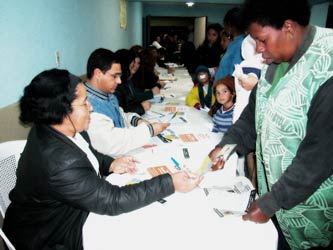Participatory Budgeting
Adopting participatory budgeting in other countries
Few means, but ones that can be freely used
A vital factor in the success of participatory budgeting is the degree of financial and administrative autonomy of the local authorities. The municipality must be able to decide where and how local resources are allocated. Otherwise, participatory budgeting will be no more than an educational tool for local democracy and not a means of distributing limited resources. Previous decentralisation experiences can facilitate the establishment of participatory budgeting, making local administrators more open to administrative reforms involving the population.
The need for political cohesion
Participatory budgeting is a long and complicated process, and a certain degree of political and administrative stability is required. On the other hand, political authorities must be flexible enough to accept the population into the decision-making process. They must have the resources and the capacity to reform bureaucracy so that the process of participatory budgeting can be guaranteed in accordance with established regulations. Changes in regulations may be necessary vis-à-vis procedures for formulating the budget by local authorities. Still, it must be underlined that participatory budgeting intervenes in the planning stage of budgetary proposals, while formal approval remains under the authority of the municipal chamber of deputies.
A pre-existent social basis
Participatory budgeting will have a greater chance of success if there are organised citizen networks and associations to support it. During the initial phase, most of those taking part in participatory budgeting will come from political backgrounds. Therefore, participatory budgeting should quickly be placed on a broad popular basis, which can be facilitated by the existence of networks. This will give credibility and legitimacy to reforms implemented by the local government in participatory budget planning.
Participatory budgeting involves joint management. Porto Alegre is a benchmark for similar experiences of democratic management and administrative transparency in more than a hundred towns and cities in Brazil and the rest of the world. Ways need to be found to overcome political passivity and favouritism, and to stimulate participation. Objective criteria must be used to define plans for investment and expenditure that are accepted by communities and involve the entire city, following an order of priorities that take into account the enormous differences that may exist.
DOWNLOAD THE BROCHURE PDF
portuguese (0.8 MB)english (1.0 MB)
spanish (1.0 MB)
ONLY TEXT
•Participatory Budgeting in practice








 COUNTRY OF ORIGIN
COUNTRY OF ORIGIN